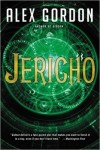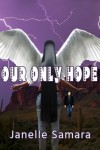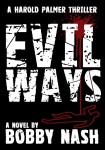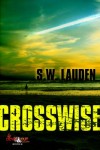

April 4 – 10: “Do you need music or absolute silence when writing?”
 We have a steller line-up of ITW members this week as we delve into writing habits. Thomas Kirkwood, Janelle Samara, Bobby Nash, J. L. Abramo, Ryan Quinn, Chris Pavone, Alex Gordon, Elena Harwell, Allison Brennan, S.W. Lauden and Daco will answer the question on everyone’s playlist: Do you need music or absolute silence when writing?
We have a steller line-up of ITW members this week as we delve into writing habits. Thomas Kirkwood, Janelle Samara, Bobby Nash, J. L. Abramo, Ryan Quinn, Chris Pavone, Alex Gordon, Elena Harwell, Allison Brennan, S.W. Lauden and Daco will answer the question on everyone’s playlist: Do you need music or absolute silence when writing?
~~~~~
 Alex Gordon is the author of the supernatural thrillers Gideon and Jericho, which will be released April 5th. Prior to becoming a full-time writer, she spent 26 years working in pharmaceutical product R&D. She was born in the Northeast, grew up in the South, and currently lives in the Midwest.
Alex Gordon is the author of the supernatural thrillers Gideon and Jericho, which will be released April 5th. Prior to becoming a full-time writer, she spent 26 years working in pharmaceutical product R&D. She was born in the Northeast, grew up in the South, and currently lives in the Midwest.
![Pageflex Persona [document: PRS0000037_00046]](https://www.thebigthrill.org/wp-content/uploads/2016/04/brooklyn-e1459530995184.jpg) J. L. Abramo was born in Brooklyn, New York on Raymond Chandler’s fifty-ninth birthday. Abramo is the author of Catching Water in a Net, winner of the St. Martin’s Press/Private Eye Writers of America prize for Best First Private Eye Novel; the subsequent Jake Diamond novels Clutching at Straws, Counting to Infinity, and Circling the Runway; Chasing Charlie Chan, a prequel to the Jake Diamond series; and the stand-alone thrillers Gravesend and Brooklyn Justice.
J. L. Abramo was born in Brooklyn, New York on Raymond Chandler’s fifty-ninth birthday. Abramo is the author of Catching Water in a Net, winner of the St. Martin’s Press/Private Eye Writers of America prize for Best First Private Eye Novel; the subsequent Jake Diamond novels Clutching at Straws, Counting to Infinity, and Circling the Runway; Chasing Charlie Chan, a prequel to the Jake Diamond series; and the stand-alone thrillers Gravesend and Brooklyn Justice.
 Janelle Samara lives in Kansas City, Missouri, with her husband and cat. When she’s not busy writing, her favorite pastimes include devouring classic books on her tablet, growing organic vegetables, and creating new recipes for her large extended family. When she needs to get out of the house, she has many interests, ranging from watching ballet to fishing with her brothers. She also loves to continue learning and frequently listens to many educational podcasts.
Janelle Samara lives in Kansas City, Missouri, with her husband and cat. When she’s not busy writing, her favorite pastimes include devouring classic books on her tablet, growing organic vegetables, and creating new recipes for her large extended family. When she needs to get out of the house, she has many interests, ranging from watching ballet to fishing with her brothers. She also loves to continue learning and frequently listens to many educational podcasts.
 Ryan Quinn is the best-selling author of The Good Traitor, End of Secrets, and The Fall. A native of Alaska, Quinn was an NCAA DI Champion while on the University of Utah Ski team. He worked in book publishing for five years in New York City and now lives in Los Angeles where he writes and trains for marathons.
Ryan Quinn is the best-selling author of The Good Traitor, End of Secrets, and The Fall. A native of Alaska, Quinn was an NCAA DI Champion while on the University of Utah Ski team. He worked in book publishing for five years in New York City and now lives in Los Angeles where he writes and trains for marathons.
 Thomas Kirkwood is an international author best known for his Cold War thrillers. His novels have been published by Macmillan, Collier Macmillan (Europe), Penguin (Donald I. Fine), Signet, Amazon, Brilliance (audio), ACX (audio) and Stjerne-Spenning (Europe). After years in the EU, he now makes his home in Salida, Colorado. His new release, THE THIRTEENTH DISCIPLE: A REQUIEM FOR AMERICA, describes how the world’s oldest democracy set itself up to become the world’s newest dictatorship.
Thomas Kirkwood is an international author best known for his Cold War thrillers. His novels have been published by Macmillan, Collier Macmillan (Europe), Penguin (Donald I. Fine), Signet, Amazon, Brilliance (audio), ACX (audio) and Stjerne-Spenning (Europe). After years in the EU, he now makes his home in Salida, Colorado. His new release, THE THIRTEENTH DISCIPLE: A REQUIEM FOR AMERICA, describes how the world’s oldest democracy set itself up to become the world’s newest dictatorship.
 Bobby Nash is an award-winning author. He writes novels, comic books, short stories, novellas, graphic novels, and the occasional screenplay for a variety of publishers and production companies. He is a member of the International Association of Media Tie-in Writers and International Thriller Writers. For more information on Bobby Nash and his work, please visit him at www.bobbynash.com and across social media and say hi.
Bobby Nash is an award-winning author. He writes novels, comic books, short stories, novellas, graphic novels, and the occasional screenplay for a variety of publishers and production companies. He is a member of the International Association of Media Tie-in Writers and International Thriller Writers. For more information on Bobby Nash and his work, please visit him at www.bobbynash.com and across social media and say hi.
 Elena Hartwell was born in Bogota, Colombia, while her parents were in the Peace Corps. Her first word was “cuidado.” At the age of nine months, she told two men carrying a heavy table to be careful in their native tongue. She’s been telling people what to do ever since. After almost twenty years in the theater, Elena turned her playwriting skills to fiction. “One Dead, Two to Go” is her first novel.
Elena Hartwell was born in Bogota, Colombia, while her parents were in the Peace Corps. Her first word was “cuidado.” At the age of nine months, she told two men carrying a heavy table to be careful in their native tongue. She’s been telling people what to do ever since. After almost twenty years in the theater, Elena turned her playwriting skills to fiction. “One Dead, Two to Go” is her first novel.
 Allison Brennan is the New York Times and USA Today bestselling author of 27 thrillers and numerous short stories. She currently writes two series, the Maxine Revere cold case mysteries and the Lucy Kincaid/Sean Rogan romantic thrillers. Allison lives in Northern California with her husband, five kids, and assorted pets.
Allison Brennan is the New York Times and USA Today bestselling author of 27 thrillers and numerous short stories. She currently writes two series, the Maxine Revere cold case mysteries and the Lucy Kincaid/Sean Rogan romantic thrillers. Allison lives in Northern California with her husband, five kids, and assorted pets.
 Chris Pavone’s first novel, The Expats, was a New York Times and international bestseller, with twenty foreign editions and a major film deal, and received both the Edgar and Anthony awards for Best First Novel. The Accident, published in March 2014, was also an instant New York Times bestseller. The Travelers will publish on March 8, 2016.
Chris Pavone’s first novel, The Expats, was a New York Times and international bestseller, with twenty foreign editions and a major film deal, and received both the Edgar and Anthony awards for Best First Novel. The Accident, published in March 2014, was also an instant New York Times bestseller. The Travelers will publish on March 8, 2016.
 Daco is an award-winning author of the espionage-thriller series featuring CIA operative Jordan Jakes. Her debut novel, The Libra Affair, was a 2013 #1 bestseller. Daco holds a B.A. and M.A.S. from The University of Alabama in Huntsville and a J.D. from the Cumberland School of Law. She is a member of the International Thriller Writers, Mystery Writers of America, Romance Writers of America, Authors Guild, Alabama Writers Forum, Florida Writers, and Alabama State Bar.
Daco is an award-winning author of the espionage-thriller series featuring CIA operative Jordan Jakes. Her debut novel, The Libra Affair, was a 2013 #1 bestseller. Daco holds a B.A. and M.A.S. from The University of Alabama in Huntsville and a J.D. from the Cumberland School of Law. She is a member of the International Thriller Writers, Mystery Writers of America, Romance Writers of America, Authors Guild, Alabama Writers Forum, Florida Writers, and Alabama State Bar.
 S.W. Lauden is a writer and drummer living in Los Angeles. His short fiction has been published by Shotgun Honey, Out of the Gutter, Criminal Element, Dark Corners, Dead Guns Magazine, Akashic Books, WeirdBook, Spelk Fiction and Crimespree Magazine. His debut novel, BAD CITIZEN CORPORATION, was published by Rare Bird Books in November 2015. His novella, CROSSWISE, will be published by Down & Out Books in March 2016.
S.W. Lauden is a writer and drummer living in Los Angeles. His short fiction has been published by Shotgun Honey, Out of the Gutter, Criminal Element, Dark Corners, Dead Guns Magazine, Akashic Books, WeirdBook, Spelk Fiction and Crimespree Magazine. His debut novel, BAD CITIZEN CORPORATION, was published by Rare Bird Books in November 2015. His novella, CROSSWISE, will be published by Down & Out Books in March 2016.
- LAST GIRL MISSING with K.L. Murphy - July 25, 2024
- CHILD OF DUST with Yigal Zur - July 25, 2024
- THE RAVENWOOD CONSPIRACY with Michael Siverling - July 19, 2024
